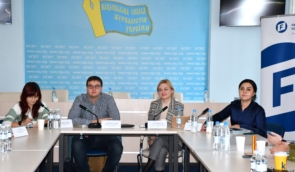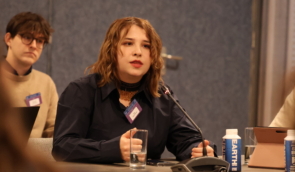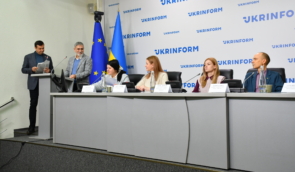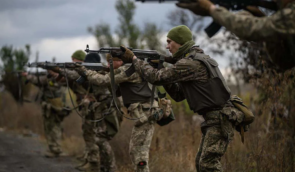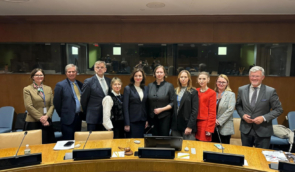“The perpetrators of human rights violations and war crimes must be held accountable… we won’t stop [until then].”
Ahead of the second anniversary of the full-scale Russian invasion of Ukraine, HRHF spoke with Ukrainian human rights defender Liudmyla Yankina about the main challenges facing civil society and the human rights environment in Ukraine. We also discussed what has changed over the last two years through the prism of her work protecting representatives of civil society.
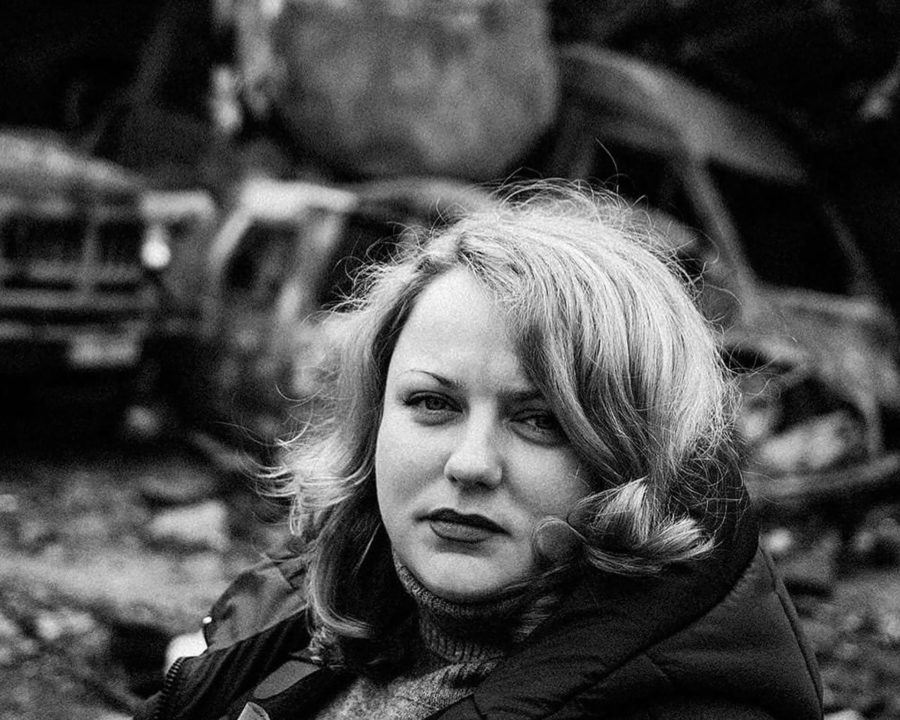 Photo by a Ukrainian photographer Vera Blansh taken in Bucha in April, 2022
Photo by a Ukrainian photographer Vera Blansh taken in Bucha in April, 2022Liudmyla Yankina is the Leader of the Civil Society Protection Unit at the Human Rights Centre ZMINA, a board member of Educational Human Rights House Chernihiv, a member of the Public Integrity Council – an independent civic body that assists the High Qualification Commission of Judges of Ukraine, and the Coordinator of the working group on the protection of Activists and Journalists within the framework of the International Council of Experts on Crimes Committed in the Conditions of Armed Conflict at the Prosecutor General’s Office.
At the beginning of the full-scale invasion, Liudmyla Yankina had to temporarily set aside her usual human rights defender role to be mostly engaged in volunteer activities, as a humanitarian volunteer and nurse. “When you document dozens of cases [volunteers and activists murdered by Russian troops in the outskirt territories of Kyiv] in March, April, and May [2022] – those were just dark months because you pass each story through yourself… I understood that in their place, it could have been me.”
Yankina says that time was a matter of physical survival. But as the front line shifted, her life has been divided into two parts – being a human rights defender and a humanitarian volunteer. ‘About ninety per cent of my human rights work is still connected to the war because since the beginning of the full-scale invasion, there has been a phenomenon of war crimes in our lives.’
What motivates you to continue your human rights work despite the challenges?
When we evacuated people from occupation, once they had arrived in a safe area, I have had people call me with tears of happiness, they are profoundly grateful because we saved them from persecution, captivity, and possibly death, and I cry along with them.
There are many achievements like this and usually it’s a very emotional matter. It’s what allows you to keep going in the profession, to stay emotionally grounded.
When we manage to provide assistance to people who still remain in occupation – sometimes it can be so bad that they have nothing to eat. For instance, we currently support a family with a disabled adult, and a small child who lost her father in the war. The family fled from the occupation three times with an infant because the occupied territories were expanding, and then they also suffered after the destruction of the Kakhovka HPP… These people call with gratitude whenever they have a rare mobile reception.
Another positive moment relates to the complex situation of the persecution of volunteers who were accused of selling humanitarian aid. We managed to prove that these people were innocent and clear their reputations, thanks to the support from the Office of the Prosecutor General, with whom we had already worked before the beginning of the full-scale invasion…
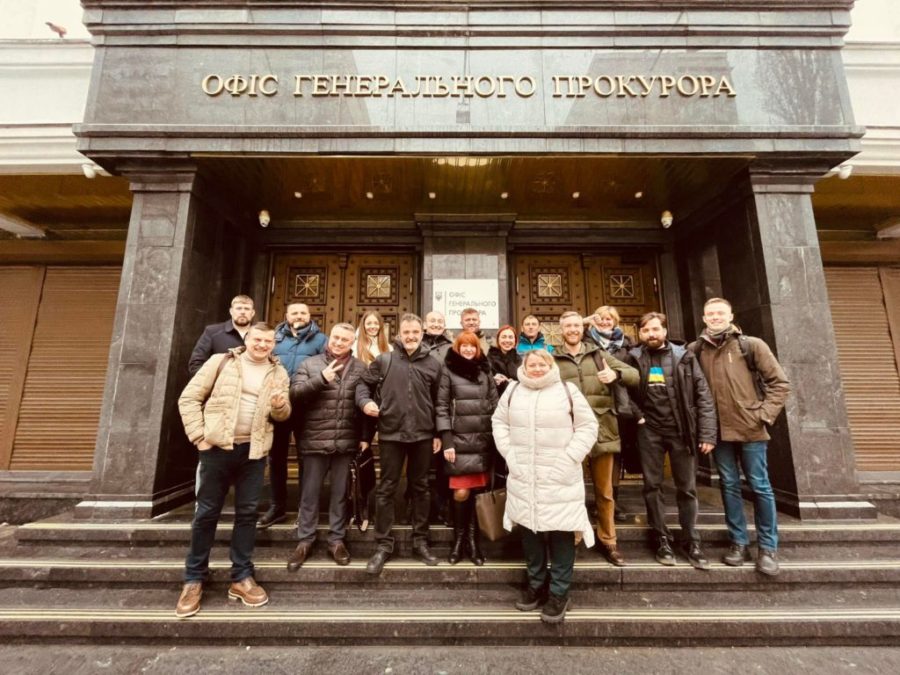 ZMINA held a meeting with the Office of the Prosecutor General and a group of volunteers against whom criminal proceedings were opened
ZMINA held a meeting with the Office of the Prosecutor General and a group of volunteers against whom criminal proceedings were openedAt first, we provided the Office of the Prosecutor General with 13 cases and our analysis which made us believe that these persecutions were illegal and that these cases were fabricated. Of course, the Office of the Prosecutor General doesn’t just trust what we say – that’s normal, but they took each of these cases under control… Since then, it was possible to close seven cases, meaning we were able to prove that those people were innocent. The positive precedent of closed cases and attention from the central level means that local prosecutors can pay attention to the presence of common elements in accusations and defamations and refuse to open cases [against innocent volunteers]. We are the only organisation that created this practice. And we are the only ones who provide such support because it’s hard work.
How has your work and outlook changed since the invasion began?
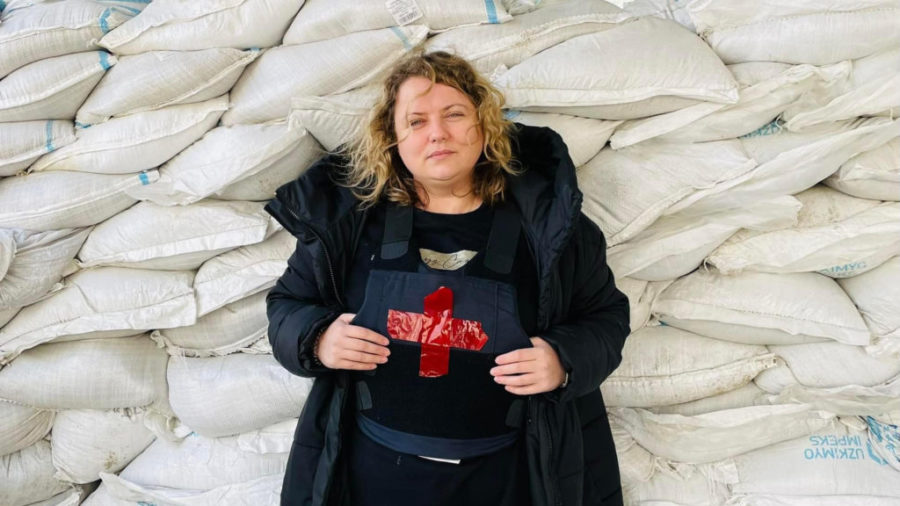 This photo was taken in April 2022 by Valentina Vakulenko
This photo was taken in April 2022 by Valentina VakulenkoOne of the extreme challenges that we face as the volume of work has increased dramatically is reduced capacity.
Many civil society representatives had to take up arms to defend the country, to defend us… Many of them are literally irreplaceable in their [civil society] roles because they have done a lot of very valuable work.
For example, when [human rights defender] Maksym Butkevych took up arms and went to fight, no one could ever replace him. He did so much and has such invaluable expertise. There is no second Maksym Butkevych.
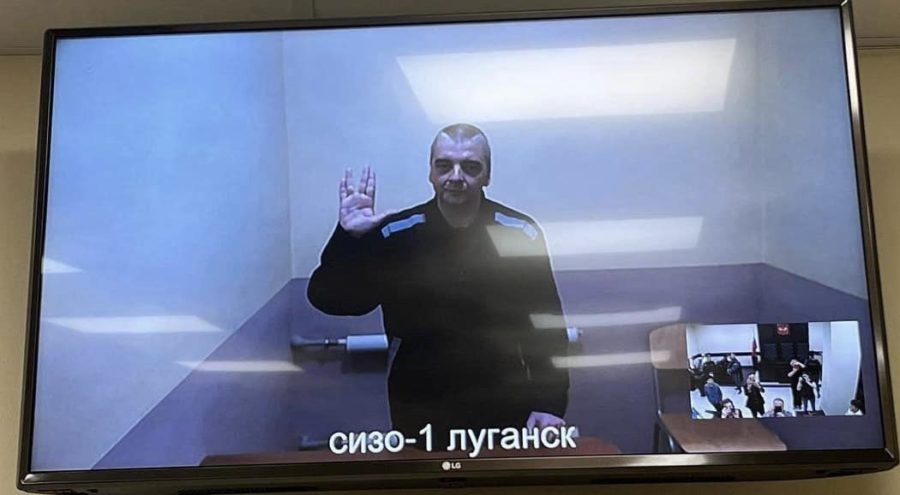 Photo of Maksym Butkevysh with Vulcan salute video-streamed from the pretrial detention centre in occupied Luhansk
Photo of Maksym Butkevysh with Vulcan salute video-streamed from the pretrial detention centre in occupied LuhanskFor the international community, it’s crucial to not stop talking about Maksym and keep up the demand for his release and return.
There will never be a second Roman Ratushny [Ukrainian journalist, environmental and civic activist killed in combat in the Kharkiv region on 09 June 2022], because he was irreplaceable in his role. What Roman did in the context of Protasiv Yar [a park in Kyiv] is a precedent that will not have equivalents for a long time – how Roman, even before the full-scale invasion, resisted the construction business oligarchy, resisted when he was threatened by the presidential administration, how he resisted even when a criminal case was fabricated against him and he was under house arrest. How hundreds of thousands of people united around him while he was being persecuted. His resistance had a colossal result, because Protasiv Yar, which locals call the “lungs of Kyiv”, is now a legally protected area, and will never be subject to any attacks from developers.
ZMINA supported the legal protection of Ratushny and the Protasiv Yar NGO in the case against them in court.
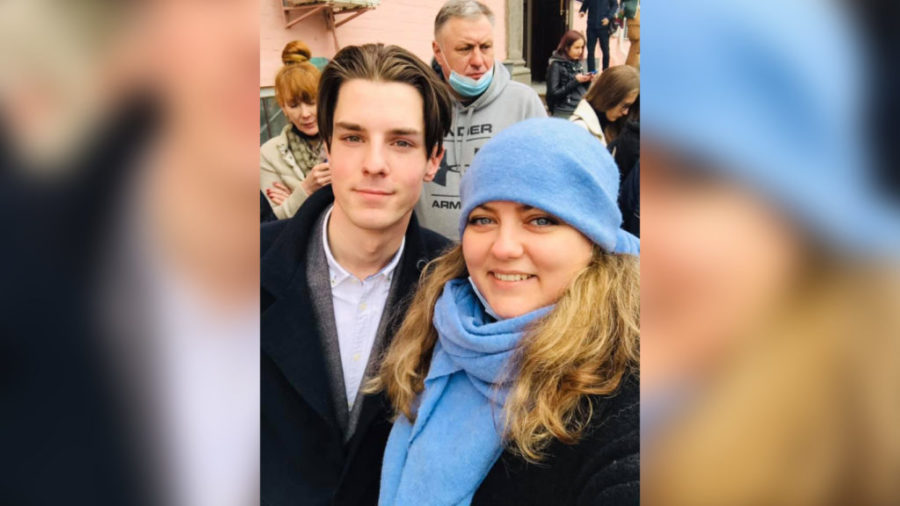 Yankina takes a selfie with Roman Ratushny during one of the court hearings in March 2021.
Yankina takes a selfie with Roman Ratushny during one of the court hearings in March 2021.How much time will we need for a second Roman Ratushny to appear? I can’t imagine how the stars have to align and how many centuries should pass so that such a person may be born. During this war, when there have been so many devastating losses, his death was one of the hardest for me.
The civil society in Ukraine plays a significant role. But now so many of those who used to defend green zones and water bodies, architectural monuments, and fought against illegal construction, were engaged in anti-corruption activities – went to defend the country, and a large number of them perished.
Since the beginning of the full-scale invasion, Ukrainian civil society has lost at least 256 persons [documented by Yankina’s team] who were irreplaceable in terms of their social roles and influence from their activities.
I have been involved in the protection of civil society representatives since 2016. This includes monitoring persecutions and providing various services related to security, advocacy and highlighting cases… Before the beginning of the full-scale invasion, the top six main categories of activists and human rights defenders persecuted by the state or third parties: anti-corruption activists, investigative journalists, environmental activists and those fighting against illegal constructions, women’s rights defenders, and LGBT community defenders. With the onset of the full-scale invasion, the profile of such persecutions changed – mainly, volunteers who assist the armed forces of Ukraine became the targets of persecution…
Now, we have more occupied territories, and there are many representatives of civil society on these territories who are severely persecuted, killed, and tortured. They are activists who, due to their activities, are persecuted by the armed forces of Russia. They must hide and escape in the most challenging ways – and we have to provide these people with a chance to survive.
Some of them, fortunately, have not yet been detained, and they require urgent evacuation due to threats of detention. Or some people have already served certain terms in Russian or occupation jails in their [occupied Ukrainian] cities, or in improvised places of detention, such as a torture chamber, for example, in the basement of a local school… They are threatened with re-arrests.
We had several cases when we had to evacuate people – it was a whole secret mission, it’s a colossal task, very complex, and it occupies all your mental space. I had a case where we were evacuating a woman from an occupied territory, and we needed to ensure her safety even in terms of her [phone and other devices], so that when she left, the [Russian] special services couldn’t intercept her or use her devices against her or access her network of contacts.
I didn’t have that skill before, but when you’re tasked with safely extracting this woman, you find new ways and create new mechanisms to protect people. You establish new partnerships with other organisations to cooperate in evacuating people. Often, the evacuation requires the whole family of the activist, including children or family members with limited mobility, which further complicates the process.
Every time we successfully manage to evacuate someone, the ones who remain gain the hope that they are not abandoned, that they are remembered, and that they are taken care of.
In response to the hundreds of such requests, the infrastructure of our activities has changed dramatically, I need to work with a variety of specialists, because after being in captivity, a person may have a broken jaw, knocked out teeth, fractures, bones that have healed incorrectly, viral infections, severe post-traumatic stress disorders, the list goes on… There are requests from journalists who, for example, get caught under missile strikes and have shrapnel injuries, facial wounds requiring a search for a plastic surgeon, for example.
We try to be very flexible in adapting our services, whether it’s missile strikes in Kyiv that have affected journalists…or a disaster like the destruction of the Kakhovka HPP – it’s a different risk, different assistance. And so we must adapt this assistance and luckily our donors understand this. We are supported by the Delegation of the European Union to Ukraine and the People in Need. Some cases are also supported in cooperation with Educational Human Rights House Chernihiv as they implement the Emergency Support Ukraine project.
Sadly, a large part of civil society representatives [from the occupied territories] are now among the civilian hostages, facing fabricated charges… Their families often turn to us for financial assistance to send parcels [to jails] or pay for a lawyer. The topic of civilian hostages is one of the most complex for civil society now.
You’ve mentioned the issue of civilian hostages. Could you explain the scale and impact of this issue in Ukraine? What efforts are being made to address the situation on the national and international levels, and what challenges do these efforts face?
I partly understand why this topic is so rarely featured in the media space because it’s extremely complicated. There are no international mechanisms, there are legislative issues, problems with law enforcement agencies, and issues with registries.
For example, we still don’t have a clear understanding of the number of civilian hostages currently in Russia and the occupied territories because there are at least three registries. They are not separated from the military ones, and might also be partially duplicated with the registry of the missing people because some of the civilian hostages are among the missing and a part of the missing is civilian hostages.
As of now, there is a preliminary understanding of what the registry should look like, where verification should occur to avoid duplication and ensure the completeness of the list… Plus, we’ve reached an agreement on the legal procedures for the report of abduction. This is complicated by the fact that the victims may be abducted in the occupied territory, or their relatives are located there, and how can their report be registered. We have concluded that, for example, human rights defenders can submit it if we have a sufficient amount of necessary information about the circumstances of the abduction.
In practice, we tried this mechanism already. We reported the abduction of a journalist Viktoriia Roshchyna, together with Sevgil Musaieva, editor-in-Chief of Ukrainska Pravda … She went missing after going to the occupied territory, to write about life there. As far as we know, now she is kept somewhere in captivity by the Russians, and we are trying to find where exactly. For the investigation process to start it was necessary to make a report, it was done based on our testimonies.
On the international level, it’s always necessary for members of the international community to call on Russia to return every single civilian hostage because holding civilians captive is a type of war crime. Civilians should not be taken as prisoners, interrogated, arrested, or accused of combatant actions, as happens in some cases. That is when initially someone is accused of extremism or something else, and then they are turned into a combatant, supposedly, so that they can be prosecuted.
The international community must clearly understand that if there is no mechanism for return in international humanitarian law, it does not justify inaction. If there is no mechanism for holding accountable those responsible for abductions, it does not mean nothing should be said.
The deprivation of a civilian’s freedom is a war crime, and those responsible must be held accountable, including those who give the orders and those who follow them.
 Photo by Yevhen Vasylyev for ZMINA report “85% of men will pass through this detention centre”
Photo by Yevhen Vasylyev for ZMINA report “85% of men will pass through this detention centre”For example, a search of a civilian’s home, to seize some “extremist” literature just because it is in Ukrainian, and to consider the storage of a Ukrainian flag at home in Ukraine as a sign of extremism, for which the person is being arrested and charged with extremism. These are serious signs of violations. And it’s not just a sign, it’s directly a war crime.
The international community must speak out clearly that the abduction and arrest of civilians is a war crime. Each person must be returned home. This is not through the demand for an exchange procedure – as no international legislation prescribes how civilians should be returned, because they should simply be released unconditionally to return home.
To understand the scale of this problem, there are tens of thousands civilian hostages [28,000 according to Ukrainian Ombudsman Dmytro Lubinets]. The Office of the Prosecutor General has launched what’s called a Coordination Center for the Support of Victims and Witnesses – a coordination centre that aids victims of Russian crimes and witnesses. It is also gradually creating a network of organisations ready to provide their services [to victims] which would include psychological support, medical assistance, and financial compensation… [obtaining this status] is certainly not an easy process, but, for example, our lawyers can provide such support.
There’s currently an unresolved problem regarding medical services, as the state still does not provide adequate medical support, which is one of our most pressing requests. People are tortured in captivity. They return with severe injuries and require various specialised medical help. We are now raising the need to coordinate with the Ministry of Health to create a separate support program at the level of medical services.
It’s also important that victims know where to go for support… The system has not yet been fully established, partly because some civilian hostages [in the past] themselves do not want to seek such help as it [providing details of what happened to them] re-traumatizes them, and partly because there is a portion of people who return from civilian captivity unofficially – therefore they don’t appear in any registries and we simply don’t know about them.
For example, a person who has come out of civilian captivity in Russia might end up in a Baltic country. And this person may not know what help is available. There should also be a mechanism in place so that such a person could address the police or the prosecutor’s office of that entry country, to say that he or she was in Russian captivity as a citizen of Ukraine, even if they crossed the border with a Russian passport because they were forcibly passported. They should be provided with contact with Ukrainian law enforcement agencies. A criminal proceeding should be opened for them, and a system of support for this person should be initiated.
We lack a large informational campaign that would encourage people [victims or their family members] to approach us because the number of open criminal cases does not match the number of abducted people.
Not all of them understand that a war crime has been committed against them. They might need an explanation – that if you were in such a situation, you were detained, a bag was put over your head, you were threatened, coerced into collaboration, you went through filtration measures, you were beaten, threatened with rape, if you were subjected to torture – it’s a war crime, please reach out, those responsible should be held accountable.
Because not every civilian hostage understands that what has happened to them is an extraordinary event, it makes it hard for us to clearly understand how many people were abducted, how many are still not free, and how many were illegally imprisoned but are now free.
How is the ongoing conflict impacting the resilience and resources of civil society organisations and activists in Ukraine? What steps are being taken or are necessary to maintain their efforts and avoid burnout?
The topic of burnout is quite complex in Ukraine as it consists of several main components.
Firstly, there is an emotional burden that Ukrainian civil society experiences, given that every day brings news and missile threats overhead.
This is what reality looks like for many human rights defenders, including myself. After surviving a night of missile attacks, the workday still begins at 8 am, and professional activities continue as usual – people rely on me. In my work, aside from the initial fear and a purely emotional response during a missile attack that I might be killed, I immediately start to worry about whether any of the people that I work to protect have been affected by the attack, if there’s been any direct hits, and if they are safe.
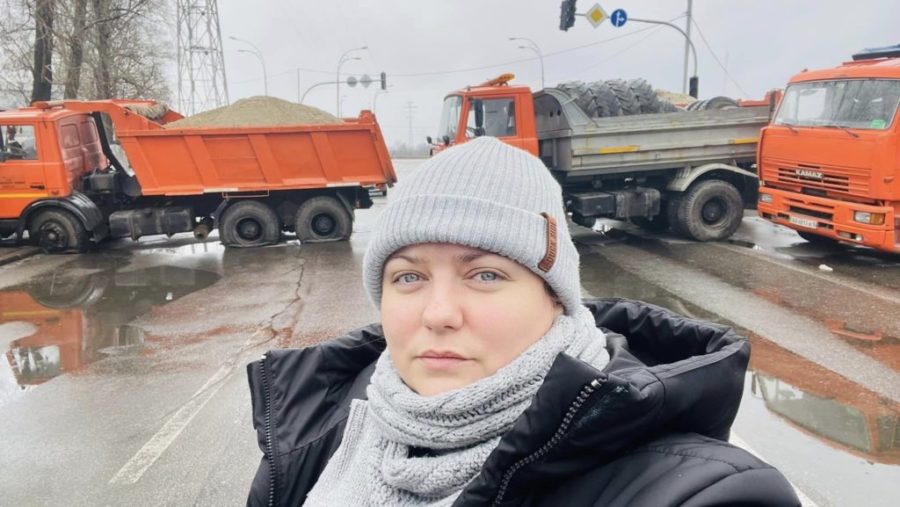 Trucks with sand, tyres and rubble play the role of a barricade
Trucks with sand, tyres and rubble play the role of a barricadeIn late December – early February, there was a significant number of victims in Kyiv and Kharkiv – activists, and journalists. Two volunteers were killed, others received shrapnel wounds, some had their apartments completely burned down, and some saw their buildings collapse. My team and I have to document this, provide assistance, find psychologists, and so on, and I don’t have the capacity to process what’s happened to me.
As a human rights defender, due to social expectations, you’re under a sort of pressure from various factors. Hence, this is one aspect related to the impossibility of resting, combined with emotional exhaustion.
I can’t afford to be sick because requests keep pouring in, leading to a sort of chronic fatigue. Colleagues are getting very ill – burning out intensely because the accumulated stress has nowhere to go. This turns into complex depressive conditions, where you find yourself in a very tough emotional state, yet there’s no straightforward solution for your condition, because, after all, you have responsibilities.
Secondly, since the start of the full-scale invasion, the workload for human rights defenders remaining in Ukraine has dramatically increased. I have been offered a one-month retreat programme abroad, but I was told that I wouldn’t be able to work during this time. I realise this is simply unrealistic given the volume of work, rendering the programme inaccessible to me… like a child looking at the candy in a shop window – you want it, you see it but it’s not available to you.
I am a human rights defender, and I cannot stop, as the war has not stopped. I cannot just pause and say ‘I need to rest, and I won’t be able to assist the victims of Russian shellings, so for this month, Russia should not launch missile attacks, or persecute Ukrainians in the occupied territories.’
Looking ahead: with the conflict ongoing, what are your main concerns for the future of human rights in Ukraine?
My main concerns regarding the future of human rights in Ukraine, aside from the war, are the intensified persecution of journalists and the anti-corruption community, as well as investigative journalists [by the state or third parties]. There are very troubling trends emerging, and I’ve started receiving requests again for physical security support. I feel that we are starting to regress to a situation similar to two-three years ago.
The perpetrators of this persecution hire people to follow targets or show up at their doors, sending threats etc. This has been enabled because over the past two years and even before, law enforcement agencies have failed to conduct any thorough investigations into the persecution of activists, with the exception of a few cases like the murder of Kateryna Handziuk [a Kherson anti-corruption activist who died as a result of an acid attack in 2018.].
However, sadly, Handziuk’s case remains an exceptional one rather than the norm. This leads perpetrators to think they can continue acting with complete impunity – the current system of law enforcement encourages impunity.
I’m even starting to receive signals that a number of criminal proceedings in cases involving the persecution and attacks on activists and journalists are being dropped due to the statute of limitations. These were quite serious cases, such as the case of Odessa activist Oleg Mykhailyk, who, in 2018, was shot and nearly died. The bullet that hit him in the lungs, which was later removed in Germany, is still with the German prosecution. Our prosecution has not requested it and has not conducted any adequate investigative actions. We will insist on the reopening of the criminal case involving Mykhailyk and others, as we believe these cases were closed in violation of the Criminal Procedure Code. The full range of investigative actions was not carried out, therefore, these cases should be reopened, and new investigators and prosecutors should be appointed.
I fear that we might ‘return’ to 2018, when several activists were murdered.
We now have frontline roles in defending civil society, especially those who are actually involved in the protection of civil society… If I don’t protect anti-corruption activists, who are also vulnerable, then the anti-corruption activists won’t be able to expose the corruption and, accordingly, we are all in danger. And this is true for every sphere of activism.
What are your hopes for Ukraine in the coming years, and what steps are needed to realise those hopes?
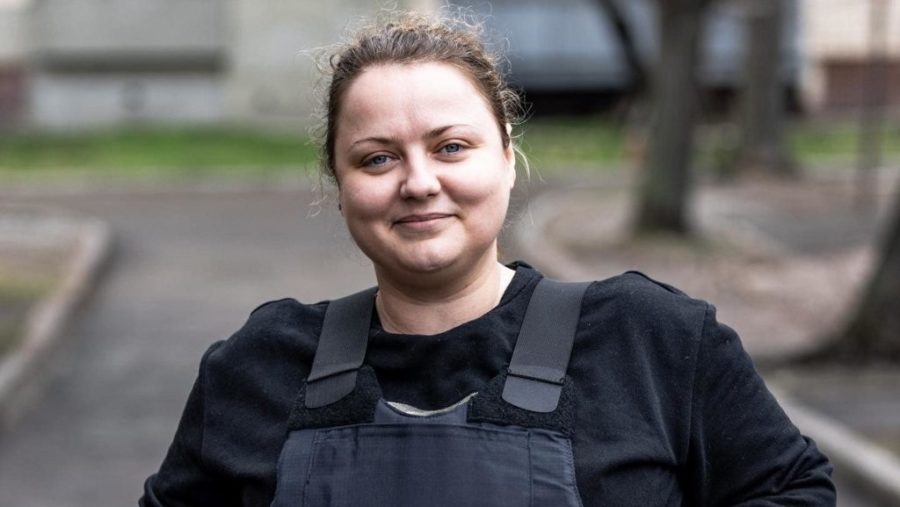 Photo taken by journalist and photographer Patrick Enssle in April 2022 in Kyiv
Photo taken by journalist and photographer Patrick Enssle in April 2022 in KyivHolding perpetrators of human rights violations and war crimes accountable. I’m essentially a marathon runner – I’m in it for the long run. I’m not involved in human rights because I enjoy working with other people’s pain and being at risk myself. I’m involved in human rights because I truly believe in justice.
When you can evaluate retrospectively and see how everything might develop, you can strategically foresee what it may lead to. So I hope that all the efforts we are currently putting into protecting civil society will not be in vain. It’s a merit that we methodically and persistently work year after year, day by day, on solving specific issues. We won’t leave until they are solved.
Source: Human Rights House Foundation
If you have found a spelling error, please, notify us by selecting that text and pressing Ctrl+Enter.

